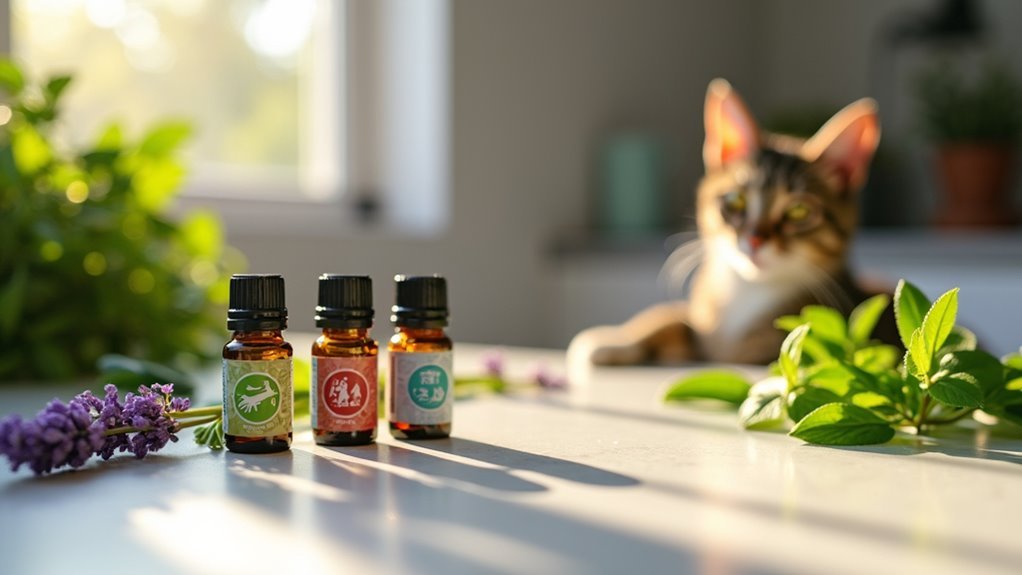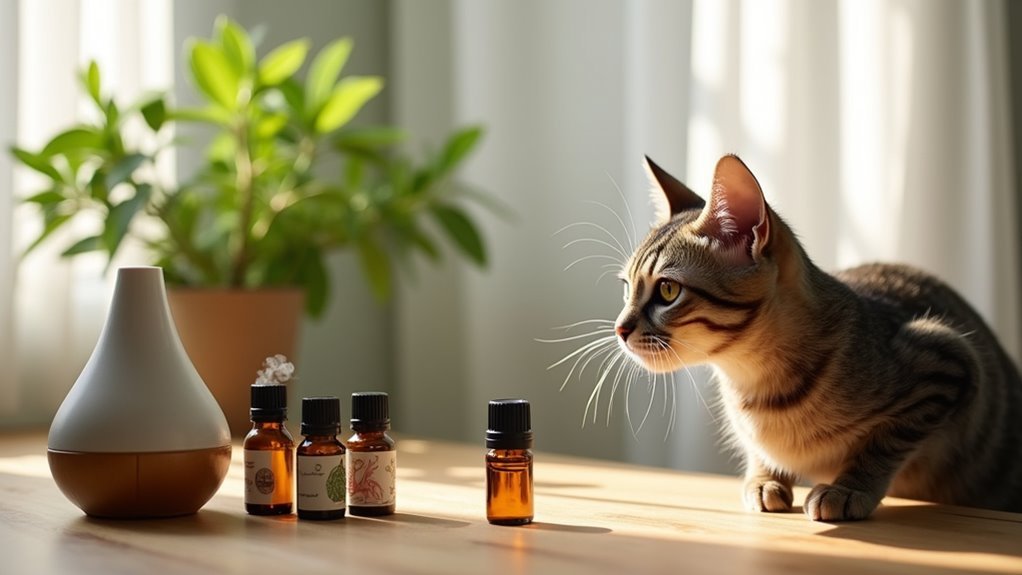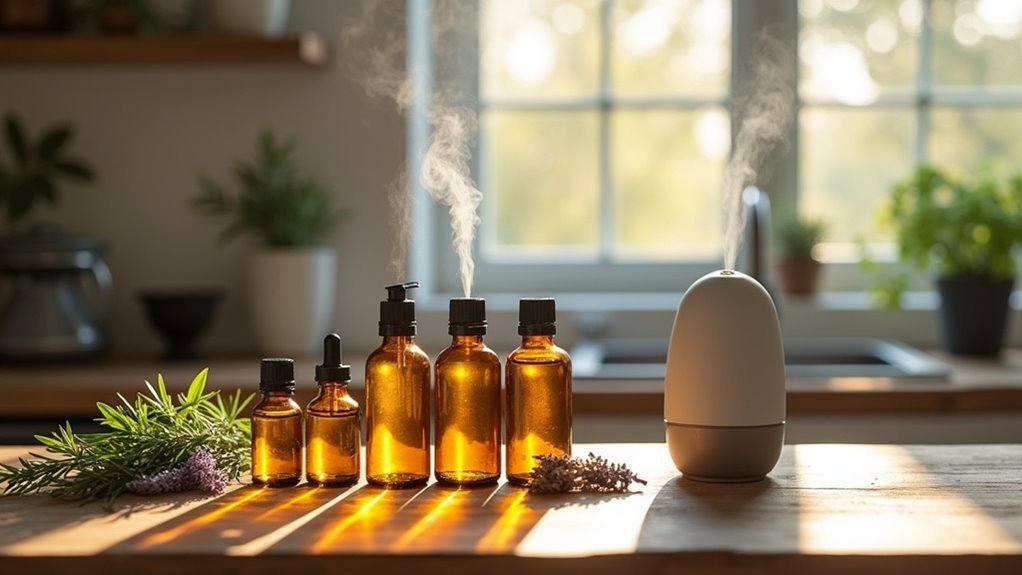You can safely control pests around your pets using five specific essential oils: cedarwood for termites, lemongrass for mosquitoes, lavender for fleas and moths, peppermint as a mosquito larvicide, and rosemary which shows 100% effectiveness against certain mosquito species. Always dilute these oils with water or carrier oils before application, use diffusers in well-ventilated areas, and avoid direct contact with your pets. Continue below to discover proper dilution ratios and application techniques.
Understanding Pet-Safe Essential Oil Properties for Pest Control

While synthetic pesticides can pose serious health risks to your furry companions, certain essential oils offer a natural and pet-safe alternative for controlling unwanted pests in your home.
Pet-safe essential oils like cedarwood oil and peppermint oil provide effective pest control without compromising your pet’s health and safety. Cedarwood oil demonstrates powerful termiticidal effects, while peppermint oil disrupts pest sensory systems for reliable natural repellent action.
Cedarwood and peppermint oils deliver powerful pest control benefits while maintaining complete safety for your beloved pets.
When creating DIY solutions, you’ll need to follow proper dilution ratios to guarantee safety and effectiveness. However, remember that pets can be sensitive to essential oils, so always research each oil’s safety profile before use.
Avoid toxic options like tea tree oil, and prioritize gentler alternatives for household pest management.
Top 5 Essential Oils That Repel Pests Safely Around Pets
Five essential oils stand out as exceptional choices for pet owners seeking natural pest control solutions that won’t harm their beloved companions.
Cedarwood oil delivers powerful termiticidal properties while remaining safe for pets, achieving complete mortality against certain pests within days.
Lemongrass oil effectively repels mosquitoes and insects without posing risks to your furry friends.
Lavender oil provides dual benefits—calming your pets while repelling fleas and moths naturally.
Peppermint oil disrupts pest sensory systems and serves as a potent larvicide against mosquito larvae when properly diluted.
Rosemary oil demonstrates 100% repellency against specific mosquito species while maintaining pet safety standards.
These essential oils offer you reliable natural solutions for thorough pest control without compromising your pets’ wellbeing, making them ideal alternatives to synthetic repellents.
Safe Application Methods for Essential Oil Pest Control

Although essential oils offer natural pest control benefits, proper application methods are crucial for maintaining your pets’ safety and health.
When using diluted essential oils for pest problems, always mix them with water or carrier oils before spraying. Use diffusers in well-ventilated spaces and limit diffusion time to just a few minutes.
Never use direct topical application on your pets – instead, apply treatments where pests gather while keeping animals away until surfaces dry completely.
Monitor pets closely for adverse reactions after treatment. If you notice distress signs, consult a vet immediately.
Consider combining essential oils with alternative pest control methods like ultrasonic repellers or mechanical traps. These safe application methods guarantee effective pest control while protecting your furry family members from potential toxicity.
Recognizing Signs of Essential Oil Sensitivity in Pets
Even with careful application methods, you need to watch for signs that your pets might be experiencing sensitivity to essential oils.
Even with proper precautions, pet owners must remain vigilant for any signs of essential oil sensitivity in their animals.
Cats are especially vulnerable to toxicity because they lack essential liver enzymes that process these compounds. You’ll want to monitor your pets closely since individual reactions vary considerably.
Watch for these key symptoms of essential oil sensitivity:
- Difficulty breathing, coughing, or wheezing from respiratory irritation
- Excessive drooling or gastrointestinal distress
- Lethargy or unusual weakness
- Muscle tremors or coordination problems
- Skin irritation or redness
Remember that grooming behavior increases risk since pets can ingest oils from their fur.
Safe essential oil use requires constant monitoring for any unusual behaviors or symptoms after exposure.
Creating Effective Pet-Safe Essential Oil Pest Control Blends

When you’re dealing with pest problems while keeping your pets safe, creating your own essential oil blends offers an effective solution that doesn’t compromise your furry friends’ health. Certain essential oils like cedarwood, lemongrass, and lavender are excellent for repelling pests while being used safely around pets.
| Essential Oil | Drops | Purpose |
|---|---|---|
| Peppermint | 10-15 | General pest deterrent |
| Clove | 5-10 | Strong insect repellent |
| Cinnamon | 5-10 | Multi-pest control |
Always dilute your natural oil blend with carrier oil at 1-2% concentration. Pet owners should apply these health products using spray bottles at entry points, then monitor pets for reactions. Before using essential oils for pest control, consult with a vet about the safety of essential oils specific to your pet’s needs.
Frequently Asked Questions
What Is the Safest Essential Oil for Pets?
You’ll find lavender oil is the safest essential oil for your pets. It’s well-tolerated by dogs and cats, offers calming effects, and rarely causes irritation when you use it properly diluted.
Is There a Pet Friendly Essential Oil Bug Spray?
You can find pet-friendly essential oil bug sprays containing peppermint, cedarwood, or rosemary. Look for properly diluted commercial products like Dr. Killigan’s, or make DIY versions using pure oils with proper dilution ratios.
What Is the Best Essential Oil to Get Rid of Bugs?
You’ll find peppermint oil most effective against bugs since it disrupts their sensory systems and kills mosquito larvae. It’s versatile, working on multiple pest species while being safer around pets than synthetic pesticides.
How Do You Mix Essential Oils for Pest Control?
You’ll mix 10-20 drops of essential oils like peppermint, clove, or cedarwood with 2 cups of water in a spray bottle. Always dilute properly and combine multiple oils for enhanced effectiveness.
In Summary
You’ve now got the knowledge to tackle pest problems while keeping your furry friends safe. Remember to always dilute essential oils properly, watch for sensitivity signs, and start with small test areas. Don’t forget that what’s safe for dogs might not work for cats, so research each pet’s specific needs. With these five pest-busting oils and proper application methods, you’ll create a naturally protected home that’s comfortable for everyone.





Leave a Reply